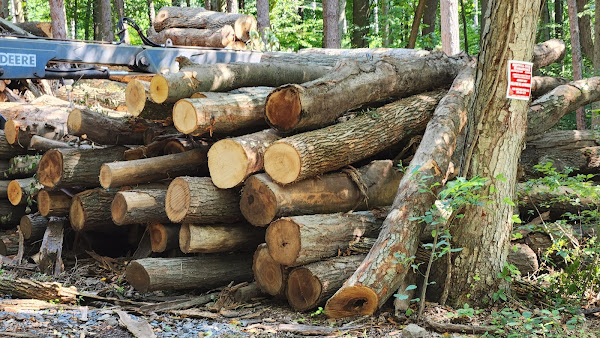
|
|
Logging at Merrill Creek Reservoir - Summer 2023 |
Residents of Warren County remember the three major Delaware River floods that occurred within a year and a half in 2005 and 2006. The alarming frequency sparked concern, leading many to point fingers at reservoirs like Merrill Creek. These reservoirs are designed to regulate water levels in the river, mitigating both floods and low-water events. Critics argued that managers kept water levels in these reservoirs too high, causing them to release excess water during floods and contribute to the problem. While these accusations remain unresolved, they highlight the potential impact of this private enterprise on lives and property throughout the Delaware River watershed.

|
|
Flooding in the Warren County area, 2011 |
Several rain events in December 2023 and January 2024 caused the Delaware River to rise near flood stage. These were not exceptional events like hurricanes, but rather typical rainfall. Given the expected increase in rain due to climate change, flooding poses a growing threat to New Jersey. Residents along the Delaware River have reason to question whether logging is the wisest choice for managing the land around the reservoir.
Tree removal, particularly large trees, is a well-known contributor to flooding. For this reason, the NJDEP prohibits vegetation removal in riparian buffers within flood hazard areas. However, an exception exists for commercial logging. This means logging falls under "agricultural use" and bypasses flood hazard area regulation.
Recently, Merrill Creek implemented a plan to harvest timber around the
reservoir. Logging poses numerous threats to water quality. Run-off from
logged areas can cause erosion, washing mud and silt into sensitive trout
production streams. This deprives fish and amphibians of oxygen and pollutes
drinking water sources for the entire region.

|
|
Do not be fooled - "Restoration" is a common greenwashing term |
Many argue that private property owners have the right to log their land and defend Merrill Creek as a private enterprise. However, it's important to remember that the consortium of power companies that owns Merrill Creek also controls water levels in the Delaware River, directly impacting numerous other private property owners. Is the financial gain from timber harvesting truly more important than protecting the well-being of others?

|
|
Delaware River ecosystem can be threatened by water runoff |
An alternative exists. New Jersey now allows private property owners to gain agricultural assessment for their forests without cutting down trees. Instead, they can create a forestry plan that focuses on ecological restoration. This kind of plan creates benefits like water quality and quantity protection, species diversity, and invasive species removal. This approach allows landowners to enhance the value of their forested land while receiving tax breaks, all without harming the property of others.

|
|
Merrill Creek Reservoir during fall season |
Isn't this a better option for Merrill Creek? After all, wild lands are
not just wild; they are working lands with immense potential.


No comments:
Post a Comment
Comments are subject to our Terms of Use